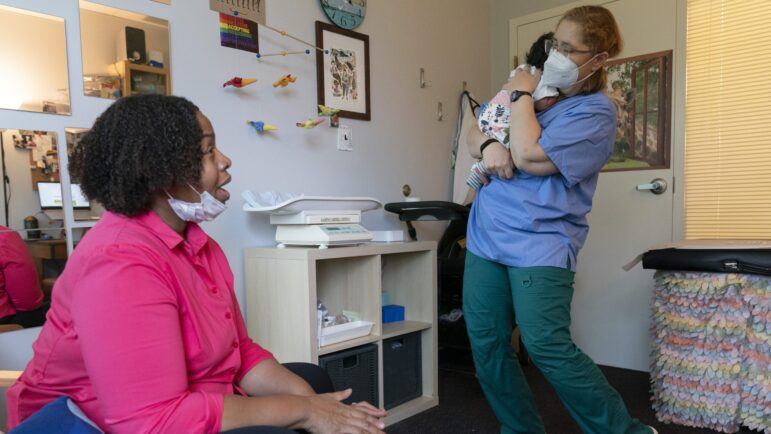August is National Breastfeeding Month, but Alabama, Louisiana and Mississippi have some of the lowest breastfeeding rates in the country.
That’s why lactation consultants and local advocates are using this month to spread awareness and resources to help new moms start and keep breastfeeding.
The decision to breastfeed your baby is highly personal, and not every mother is able to do it. But, if you can, research shows significant benefits for both mom and baby. Midwives and medical professionals call breastmilk “liquid gold” because it provides the ideal balance of fat, sugar, water and protein needed for a baby’s growth and development.
“A mother’s milk is perfectly engineered for her baby,” said Portia Williams, an International Board Certified Lactation Consultant (IBCLC) in New Orleans. “It has all the correct components that you need.”
According to the American Academy of Pediatrics, breastfeeding exclusively for the first six months can significantly reduce the risk of various infections, including:
- Respiratory Infections: Breastfed babies have lower rates of pneumonia, colds, and viruses.
- Gastrointestinal Infections: Breast milk helps prevent diarrheal diseases.
- Ear Infections: Otitis media is less common in breastfed infants.
- Chronic Conditions: The risk of developing chronic conditions such as asthma, allergies, type 1 diabetes, and childhood leukemia is reduced.
Breast milk also promotes a healthy gut microbiome, which is crucial for long-term digestive health. The immune-boosting properties of breast milk are unmatched, providing infants with critical protection during their early months of life.
Mothers benefit from breastfeeding as well. It stimulates the release of oxytocin, a hormone that helps the uterus return to its pre-pregnancy size and it reduces postpartum bleeding. Mothers who breastfeed also have a lower risk of developing breast and ovarian cancers, type 2 diabetes, and cardiovascular disease.
Williams said Black mothers have some of the lowest breastfeeding rates, and her job often involves explaining the benefits of breastfeeding to families — not just moms.
“A lot of it is culture, a lot of it is education, resources and availability,” she said.
Williams said one of the most rewarding aspects of her job is “helping families heal generationally.” In many Black families in the South, Williams said family tradition can often influence the decision to breastfeed.
“I had a mother, a grandmother, and a great-grandmother, and the mother was trying to breastfeed,” Williams said. “The grandmother and great-grandmother said they don’t breastfeed. I asked them to tell me about that, and they both started talking and shared that they wished they did, but they didn’t. So then I helped them heal that.”
Additionally, Williams said many moms, especially low-income moms, face real challenges when it’s time for them to return to work after their baby is born. They may have jobs that don’t accommodate them if they need to pump or feed their baby — which is crucial for maintaining milk supply. Research shows a big “cliff” in the data around breastfeeding rates after six months.
Lactation consultants and advocates like Williams can help educate new moms and families about the benefits of breastfeeding — as well as their rights.
“If a family calls and says, ‘My milk supply is going down, I’m not able to pump at work’ I’m going to ask mom questions about what’s allowed,” Williams said. “I want to educate her on the benefits and the laws regarding it. And with their permission, there have been times where I’ve contacted businesses or employers to ask about their breastfeeding practices.”
Williams said she’s seeing signs of improvement. More hospitals are hiring lactation consultants, connecting them with new moms so they have some extra support if they choose to breastfeed their newborns.
Here are some resources for National Breastfeeding Month:
Alabama
- Find breastfeeding classes and support groups (including virtual) at Alabama Public Health.
- Find nutritional support and breastfeeding counseling at Alabama WIC.
- Check out the free webinar on the Alabama Breastfeeding Resources Panel from the US Department of Labor on August 8, 2024.
- Find lactation support and breastfeeding support groups at Alabama Cohosh Collaborative.
Louisiana
- Louisiana Breastfeeding Coalition offers help with finding a local breastfeeding support group and finding lactation consultants and additional breastfeeding resources.
- Louisiana WIC will be posting resources for National Breastfeeding Month
- Lactation Resource Center offers lactation consultations for breastfeeding families in the Shreveport-Bossier City area of Northwest Louisiana.
- Know your rights and learn more about the laws regarding breastfeeding in Louisiana here.
Mississippi
- Find lactation services and breastfeeding resources at Mississippi Breastfeeding Coalition.
- Find breastfeeding resources and support in Jackson, Hancock, and Harrison counties at Sharing Health Education and Awareness (SHEA)
- Enroll in free breastfeeding support through WIC and the Mississippi Department of Health.
- Know your rights and learn more about the laws regarding breastfeeding in Mississippi here.
Are there any resources missing from these lists? Email Drew at drew@gulfstatesnewsroom.org to have them added.
This story was produced by the Gulf States Newsroom, a collaboration between Mississippi Public Broadcasting, WBHM in Alabama, WWNO and WRKF in Louisiana and NPR. Support for health equity coverage comes from The Commonwealth Fund.

